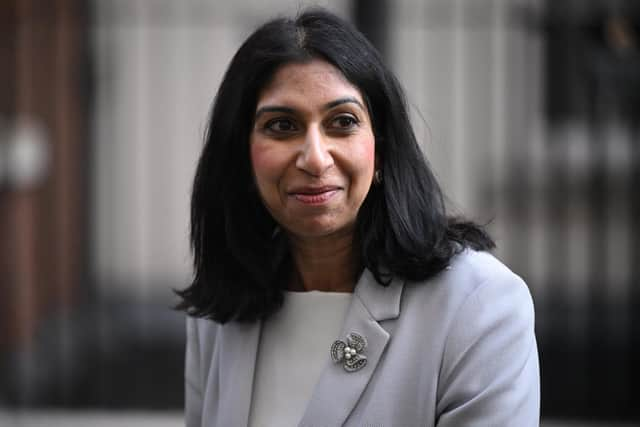Suella Braverman draws up plans to crack down on foreign students coming to UK
Under draft proposals being considered by ministers, the home secretary will make it harder for foreign students to bring their spouses to the UK, following concerns over an increase in the number of “dependant visas” handed out over the past few years.
Home Office data published earlier this year showed the number of dependants of foreign students granted visas has increased five-fold in just three years, from 13,664 in 2019 to 81,089 in the year ending June 2022.
Advertisement
Hide AdAdvertisement
Hide AdMinisters are understood to be particularly concerned the figures are inconsistent across different nationalities. Nigerian citizens accounted for 40 per cent of all dependants in the 12 months to June, despite Nigerian students making up only 7 per cent of all foreign students over the same period.


Ms Braverman is reportedly planning to increase the minimum income threshold for foreign students bringing dependents with them to the UK in a bid to reduce overall visa numbers, The Times first reported.
Currently, students who plan on bringing a spouse, partner or child with them to Britain must earn at least £680 a month for each dependant.
The home secretary is reportedly also considering increasing the minimum income threshold for British citizens applying for a family visa for a spouse or children.
At the moment, a couple must prove that they have a combined income of at least £18,600 a year and enough money to support any children who do not have British citizenship.
Ms Braverman’s blueprint for reducing foreign visa numbers would also see an increase in minimum salary thresholds for workers filling jobs on the shortage occupation list.
The shortage occupation list hands employers greater flexibility to hire specialists such as mechanical engineers, architects and vets from overseas. Many of the salary thresholds have not been updated for a decade, and are as low as around £18,000 for some professions.
It comes after the Prime Minister vowed to crack down on net migration last month after figures from the Office for National Statistics (ONS) showed record arrivals last year.
Advertisement
Hide AdAdvertisement
Hide AdNet migration hit an all-time high of 504,000 in the year to June, driven by a record 476,000 foreign students arriving in the UK.
A spokesperson for Rishi Sunak said the Government would be “considering all options” to bring the number down, including introducing a cap on visas for overseas students.
However, the Government’s plans to curb foreign student numbers have sparked concerns over Britain’s soft power and the cost to British universities.
Universities UK, which represents 140 universities across Britain, said measures making it harder for foreign students to study in the UK would ultimately push away valuable post-graduates who make a “huge contribution to research and the skilled economy”.
Vivienne Stern, chief executive of Universities UK, said last month that introducing a cap on foreign student numbers was “nonsensical” and showed little more than “crude political thinking”.
She noted that just three years ago the Government set a target to increase the number of international students enrolled at UK universities from 470,000 in 2017/18 to 600,000 by 2030.
“They seem to want to go back to a target … why go back to something that was an albatross around your neck? I don’t understand it,” Ms Stern said.
“It’s nonsensical for the UK Government to think about restricting the UK’s popularity with international students, especially when they’re so adamantly focused on growth. I don’t understand the politics of it.”
The Home Office was approached for comment.
Comments
Want to join the conversation? Please or to comment on this article.